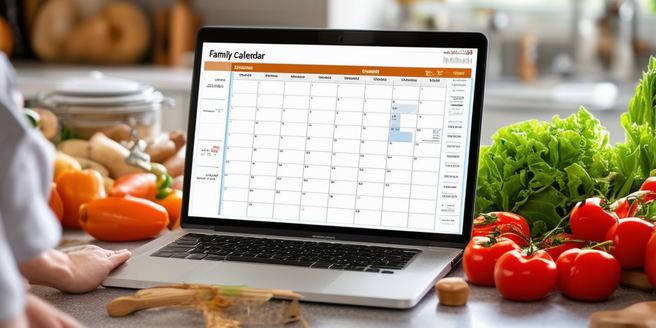
Benefits of a Family Calendar System
A family calendar system is essential for keeping everyone organized and on track. It allows family members to coordinate schedules, avoiding conflicts and last-minute surprises. By having a central place where all activities are listed, communication improves, and everyone is on the same page. Additionally, it fosters responsibility among children as they learn to manage their time effectively. With a family calendar, you can plan ahead, whether it’s for upcoming school events, holidays, or medical appointments, ensuring nothing important is overlooked. It also helps in allocating time for family activities, strengthening bonds. Thus, a family calendar system simplifies planning, reduces stress, and enhances time management, benefiting everyone involved.
Choosing the Right Calendar Format
Choosing the right calendar format is crucial for creating a successful family calendar system. Consider whether a digital or a physical calendar works best for your family. Digital calendars, such as Google Calendar or Apple Calendar, offer easy access from smartphones and can be shared in real-time. Featuring reminders, they ensure no one forgets upcoming events. On the other hand, a physical calendar, like a large wall planner or a wipeable whiteboard, offers a visible central location in the home for everyone to see. It’s perfect for families who prefer writing things down or for young children who can’t yet use digital devices. Consider family habits and preferences when selecting the format, ensuring it fits naturally into daily routines.
Setting Up Your Calendar for Success
Setting up your family calendar system is the first step toward efficient time management. Begin by identifying key categories relevant to your family, such as school, work, extracurricular activities, and family events. Assign each category a distinct color for quick visual reference. Next, populate the calendar with recurring events like school days, work hours, and regular activities. Remember to include buffer times for travel or preparation, ensuring scheduling accuracy. Designate one day each week for planning, encouraging everyone to contribute any new events or changes. Ensure the calendar is easily accessible to all family members, whether it’s through shared digital access or a prominently placed physical calendar. By organizing from the start, your family is set for greater coordination and reduced stress.
Incorporating Everyone’s Schedules
Successfully integrating everyone’s schedules into a family calendar system requires collaboration and consistency. Start by gathering each member’s commitments, such as work hours, school timings, extracurricular activities, and social plans. This comprehensive understanding helps avoid scheduling conflicts and ensures fair distribution of responsibilities. Encourage each family member to update any changes in real-time, fostering a habit of accountability. For younger children, consider using symbols or colors they can easily recognize, involving them in the planning process. Schedule regular family meetings to review and adjust the calendar as needed, accommodating any new activities or changes in routine. By incorporating everyone’s schedules, the family calendar becomes a reliable tool for uniting household dynamics and maintaining balance.
Tips for Maintaining Consistency
Consistency is key to maximizing the benefits of a family calendar system. Start by establishing a regular routine for updating the calendar, involving everyone in the process. Encourage family members to check the calendar daily, making it a part of their morning or evening routines. Use reminders and alerts, especially for digital formats, to keep everyone informed of upcoming events. Make the calendar visually appealing and easy to read, using color codes and clear labels. Periodically review the calendar with the entire family to address any conflicts or needed changes. Encourage transparency and accountability, allowing everyone to voice concerns or suggestions. By fostering a consistent approach, the calendar system becomes an integral part of the household, ensuring smooth coordination.
Troubleshooting Common Challenges
Implementing a family calendar system can come with its own set of challenges. One common issue is neglecting to update the calendar regularly, which can lead to missed events. Establishing a routine where everyone checks and updates the calendar daily can mitigate this. Another challenge is synchronizing digital calendars across different devices; ensure all family members are using compatible apps and platforms for seamless updates. There may also be resistance from family members who are not used to structured scheduling; emphasize the benefits of reduced stress and improved organization to gain their buy-in. Address any technical issues promptly, and remain open to adjusting the system to better suit family dynamics. By proactively troubleshooting, the calendar system can function smoothly, enhancing family coordination.
